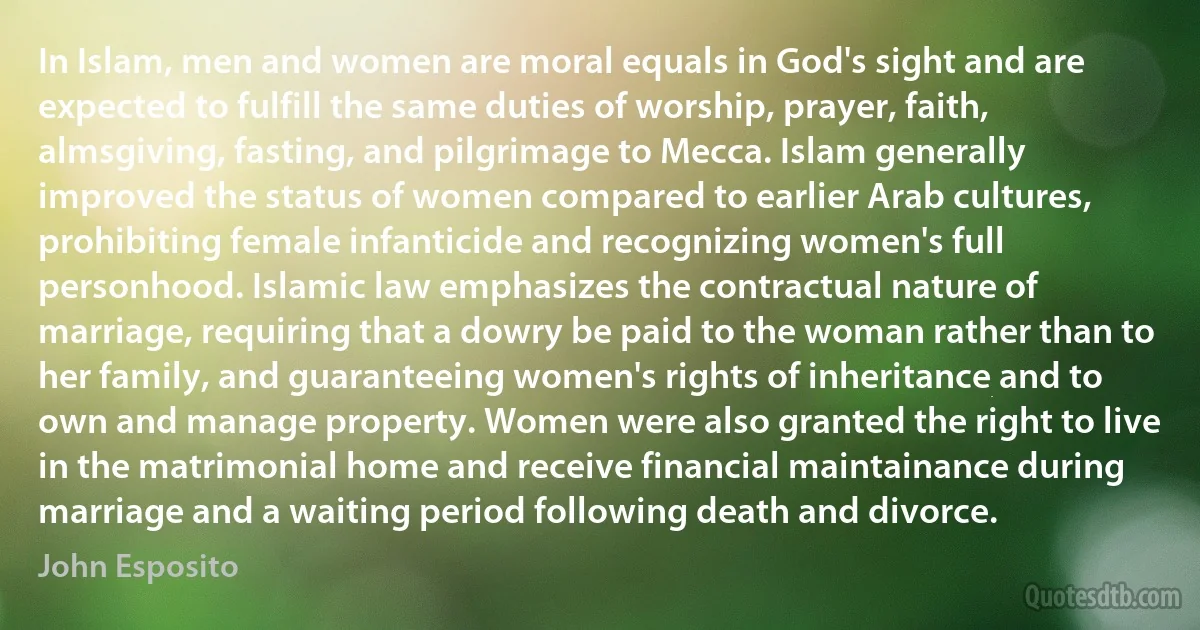
In Islam, men and women are moral equals in God's sight and are expected to fulfill the same duties of worship, prayer, faith, almsgiving, fasting, and pilgrimage to Mecca. Islam generally improved the status of women compared to earlier Arab cultures, prohibiting female infanticide and recognizing women's full personhood. Islamic law emphasizes the contractual nature of marriage, requiring that a dowry be paid to the woman rather than to her family, and guaranteeing women's rights of inheritance and to own and manage property. Women were also granted the right to live in the matrimonial home and receive financial maintainance during marriage and a waiting period following death and divorce.
John EspositoRelated topics
death divorce early faith family fasting female following full women home infanticide inheritance islam men law live marriage matrimonial nature pay prayer property receive requiring right sight waiting woman worship islamic contractual equals personhoodRelated quotes
In this book I am concerned with certain kinds of communication: communication between parents and children, between associates of the same status, between members of different societies and, through the mediation of various kinds of coding-tools, art, script, formulas, film-between cultures distant from each other in time and place. I shall be concerned to show that we must deal not only with evolutionary sequences, in which our ability to articulate and codify parts of the culture enormously increases our ability to intervene in the cultural process, but also with the coexistence at any period of history of earlier forms of communication side by side with later ones.

Margaret Mead
The idea of not having a Deity that he could not comprehend had long been one of Roswell Gardiner's favourite rules of faith. He did not understand by this pretending dogma, that he was, in any respect, of capacity equal to comprehend with that of the Divine Being, but simply that he was not to be expected or required to believe in any theory which manifestly conflicted with his knowledge and experience, as both were controlled by the powers of induction he had derived directly from his Creator. In a word, his exception was one of the most obvious of the suggestions of the pride of reason, and just so much in direct opposition to the great law of regeneration, which has its very gist in the converse of this feeling --Faith.

James Fenimore Cooper
Naguib Mahfouz, an Egyptian novelist who was the first Arabic writer to receive the Nobel Prize for literature and who was often considered the greatest writer in the Arab world... lived his entire life in Cairo, which provided the inspiration and backdrop for almost all of his writing... He set most of his works in the ancient Islamic quarter of Cairo, with its mosques and serpentine alleys teeming with shopkeepers, metalsmiths, government workers, peasants, prostitutes and thieves. His vibrant novels portraying life at every level of society were often likened to those of such other writers of urban social realism as Charles Dickens, Honore de Balzac and Emile Zola.

Naguib Mahfouz
The connection of Islam to Arabism is not, therefore, similar to that of any religion to any nationalism. The Arab Christians, when their nationalism is fully awakened and when they restore their genuine character, will recognize that Islam for them is nationalist education in which they have to be absorbed in order to understand and love it to the extent that they become concerned about Islam as about the most precious thing in their Arabism. If the actual reality is still far from this wish, the new generation of Arab Christians has a task which it should perform with daring and detachment, sacrificing for it their pride and benefits, for there is nothing that equals Arabism and the honor of belonging to it.

Michel Aflaq
Leading a life like that got me thinking about some big questions. It is sometimes said that Americans and Europeans differ a lot and that they are growing further apart. I disagree-we share the same fundamentals, and that binds us together. Western societies guarantee their citizens something that no other civilizations grant them: privacy. It's one of those things you tend to take for granted unless you lose it. The importance of privacy is unique to Western society with its notion of the sovereign individual. In stark contrast to Western norms, Islam robs people of their privacy and dignity. Islamic societies-including Islamic enclaves in the West-exert tight social control that is indicative of the totalitarian character of Islam.

Geert Wilders
